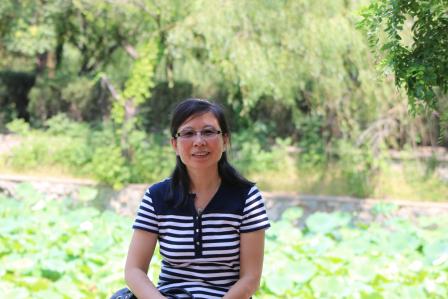Meet EPA Biologist Haiyan Tong MD, Ph.D.
 Meet EPA Biologist Haiyan Tong!EPA research biologist Haiyan Tong focuses on studying the cardiovascular effects of air pollution exposure and intervention strategies that can mitigate these effects.
Meet EPA Biologist Haiyan Tong!EPA research biologist Haiyan Tong focuses on studying the cardiovascular effects of air pollution exposure and intervention strategies that can mitigate these effects.
When did you first know you wanted to be a scientist?
I’ve always liked math and science. I was a physician in Beijing, China, and during my residency training I began to think about the mechanisms of disease processes and treatments. This curiosity brought me to the US for graduate school and I have been obsessed with science ever since.
Tell us about your background.
I came to the US for graduate school in the early 1990s. I received my doctorate in cardiovascular physiology at the University of Florida. My dissertation focused on understanding how the neuroendocrine system regulates blood pressure. Then I went to North Carolina for a postdoctoral position at the National Institute of Health’s National Institute of Environmental Health Sciences and my research focus shifted to cardiac protection. I served as research faculty, continuing studies on cardiac protection at the Duke University Medical Center, before I joined EPA in 2006.
What do you like most about your research?
I like that there is always something new to explore. Science is always changing and advancing, and it is exciting to be part of that process. For example, I have been awarded an EPA Pathfinder Innovation Project to use retinal images to look at responses to air pollution in the smallest types of blood vessels. The award allows me to explore new techniques in clinical research.
I like working with smart, dedicated, hardworking, and diversely talented collaborators in my research. I also enjoy mentoring undergraduate and graduate students, and postdoctoral fellows.
How does your science matter?
According to the World Health Organization, outdoor air pollution causes approximately four million premature deaths each year worldwide. Additionally, exposure to air pollution can exacerbate existing cardiovascular disease. The implementation of the Clean Air Act has brought forth substantial improvements in air quality and as a result, benefits to the public health. But there is still work to be done to protect the public from the heath effects of air pollution.
I work with a team of researchers to identify preventative strategies to reduce cardiovascular risk from air pollution exposure. Our team is investigating how changes in diet, including different supplements, can mitigate the impacts different air pollutants have after exposure. Given the global burden of disease, there is much interest in our research by scientific and non-scientific communities in the US and abroad.
If you weren’t a scientist, what would you be doing?
I like managing finances at home, so I would probably be a financial planner or an accountant. I also love being outdoors, so I have wondered about being a landscape architect.
What advice would you give a student interested in a career in science?
My first piece of advice is to take diverse science courses to find what interests you. Second is to stick with the area which you are passionate about. And third is to have a good mentor who can advise and support you.
If you can have any superpower, what would you choose?
Hurricanes cause devastating damage to human life. Every time a hurricane forms, I always wish that I had the superpower to fly into the hurricane clouds and break down the hurricane force.
What do you think the coolest scientific discovery was and why?
I think the coolest discovery was the computer, which has changed the world in many ways. Computers allow us to store huge amounts of information in a small space and calculate complicated problems with ease. They also allow people to communicate effectively through the internet and social media.
If you could have dinner with any scientist, past or present, who would you choose?
I would love to have dinner with one of my mentors and role models, Elizabeth Murphy, who guided me through my postdoctoral career path. She always encouraged me to reach high with her advice “Try it, you have nothing to lose.” I have given this advice to my mentees as well.
Editor's Note: The opinions expressed herein are those of the researcher alone. EPA does not endorse the opinions or positions expressed.
